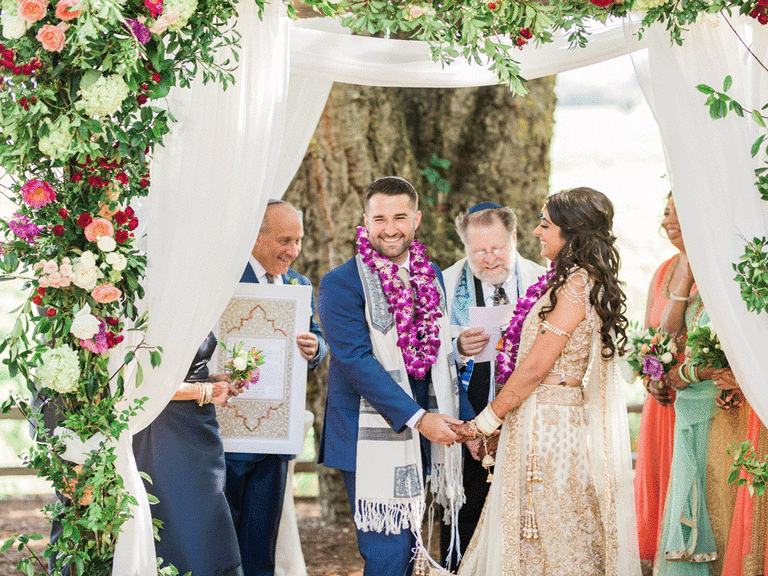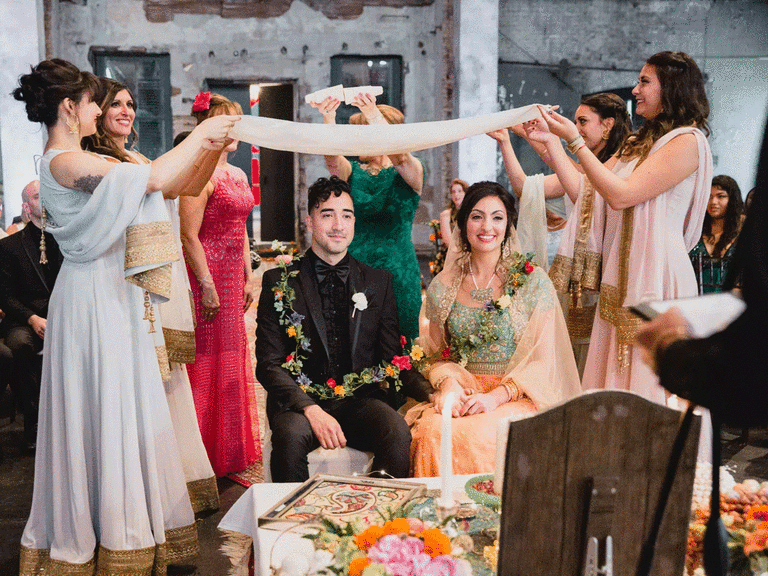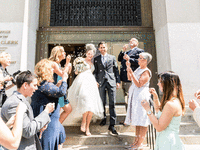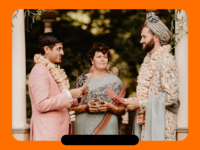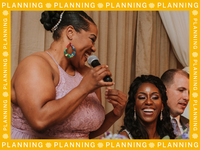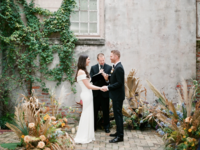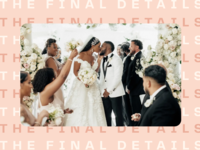Everything You Need to Know About Mixed Faith Wedding Ceremonies
If you've ever been a part of mixed faith wedding ceremony, you're probably aware of some of the unique challenges they present. Possible questions from family members, understanding the meaning behind the religious wedding practices and which practices to include are only some of the planning hiccups you may run into. But with unique challenges come beautiful rewards as long as there's an open and steady dialogue between you, your partner and both families. Read our expert advice below on how to plan a memorable mixed faith wedding ceremony from start to finish that both sides of the aisle will enjoy.
What Is an Interfaith Wedding Or Mixed Faith Wedding?
An interfaith or mixed faith wedding is a celebration where a couple with two different religious backgrounds combine both of their faiths' rituals and traditions throughout their wedding. Some couples choose to highlight both of their faiths during their mixed faith wedding ceremony and leave the reception secular.
Will my marriage be recognized by my religious community?
Depending on your and your partner's faiths, a separate religious blessing is required if you're marrying outside of the religion's house of worship. For example, if a couple is married in a mixed faith wedding ceremony and one partner is Catholic, the newlyweds will have to go to a Catholic church after the wedding to have a convalidation ceremony. A convalidation ceremony is when a couple married outside the Catholic Church wants their marriage validated by the church.
Bethel Nathan, humanist celebrant and founder of Ceremonies by Bethel, says that being accepted by your religious community is a little complicated but not impossible. "Unfortunately, there are a lot of religious figures who will not marry interfaith couples. But if the couple comes to their place of worship already married, the religious community will usually embrace them in the hopes that they will raise their family in that faith," Nathan explains. So don't look to interfaith officiants to bless your wedding since they aren't replacements for rabbis, priests or pastors. Nathan describes interfaith officiants as "neutral parties because we are not coming from a specific church or specific religion."
What should I do if my family is concerned about my interfaith ceremony?
Having an interfaith wedding ceremony can be complex, especially if your family has expressed concern about it. But if you hire an interfaith officiant, you're getting support from someone who understands your situation and is ready to guide you through it. Gerald Fierst, civil celebrant and author of The Heart of the Wedding, makes sure his couples understand that they are in control of their own ceremony. "I tell couples from the beginning, 'You are my clients.' If they want, I'm happy to have the parents sit in on the planning. Then I'm just dealing with more voices and alternatives, and the couple can come to a [final] decision," Fierst says. Don't be afraid to speak with your parents about your wishes and be open to listening to theirs. Fierst believes you should look to your family as collaborators in making the ceremony outline, so you and your family are happy.
Your family may be paying for the wedding, and according to wedding etiquette, that implies they have a say in certain aspects that impact the budget. We suggest you include your parents or grandparents in your ceremony planning, but not let money be the reason you do so. To avoid disagreements around money and who can make decisions on your ceremony, Nathan recommends you speak with your family at the beginning of the planning process. "Money tends to come with power, or people believe it does. I think it's incredibly important for the couple to talk to their families and talk about what accepting the money means," Nathan says. As the celebrant, Nathan says she deals with concerns from family members appropriately. "Every once in a while, a grandma or mom may comment after the ceremony, 'You didn't mention Jesus in there.' And I say, 'The ceremony was created with and for my couple. I believe that every religion is based on love at the core of it. And as long as we celebrate love, we honor every tradition,'" Nathan says.
Things to Consider Before Planning a Mixed Faith Wedding Ceremony
There isn't one way to plan a mixed faith wedding ceremony. Every ceremony is unique because it depends on a couple's faiths and what traditions they would like to include. Check out these tips from experts to help you prepare for the planning process.
Attend premarital counseling.
Premarital counseling isn't required for an interfaith ceremony. But many interfaith officiants offer a counseling program as an add-on to their services. If you're having two ceremonies, one that's Catholic and another one that's non-religious, for example, you would have to do premarital counseling as required by the Catholic church to have your Catholic ceremony. Nathan thinks that regardless of the counseling requirement, it's helpful for all couples, especially interfaith couples. "Counseling is a good way to learn, if you don't already know, how to communicate with both your partner and your families," Nathan says.
Use vows to acknowledge both your faiths.
When you're writing your vows, think of it as the perfect opportunity to make promises to your partner and give a nod to your faith. Fierst advises that couples still include the "for better or worse" line into their interfaith vows. "Those are vows that apply to any religion. And everybody knows them and is almost expecting them. When guests don't hear them, they think, 'Did they really get married," Fierst says. Otherwise, you can make your vows as simple or elaborate as you want. When it comes to vows, Fierst says, "if it's true to who you are, it works."


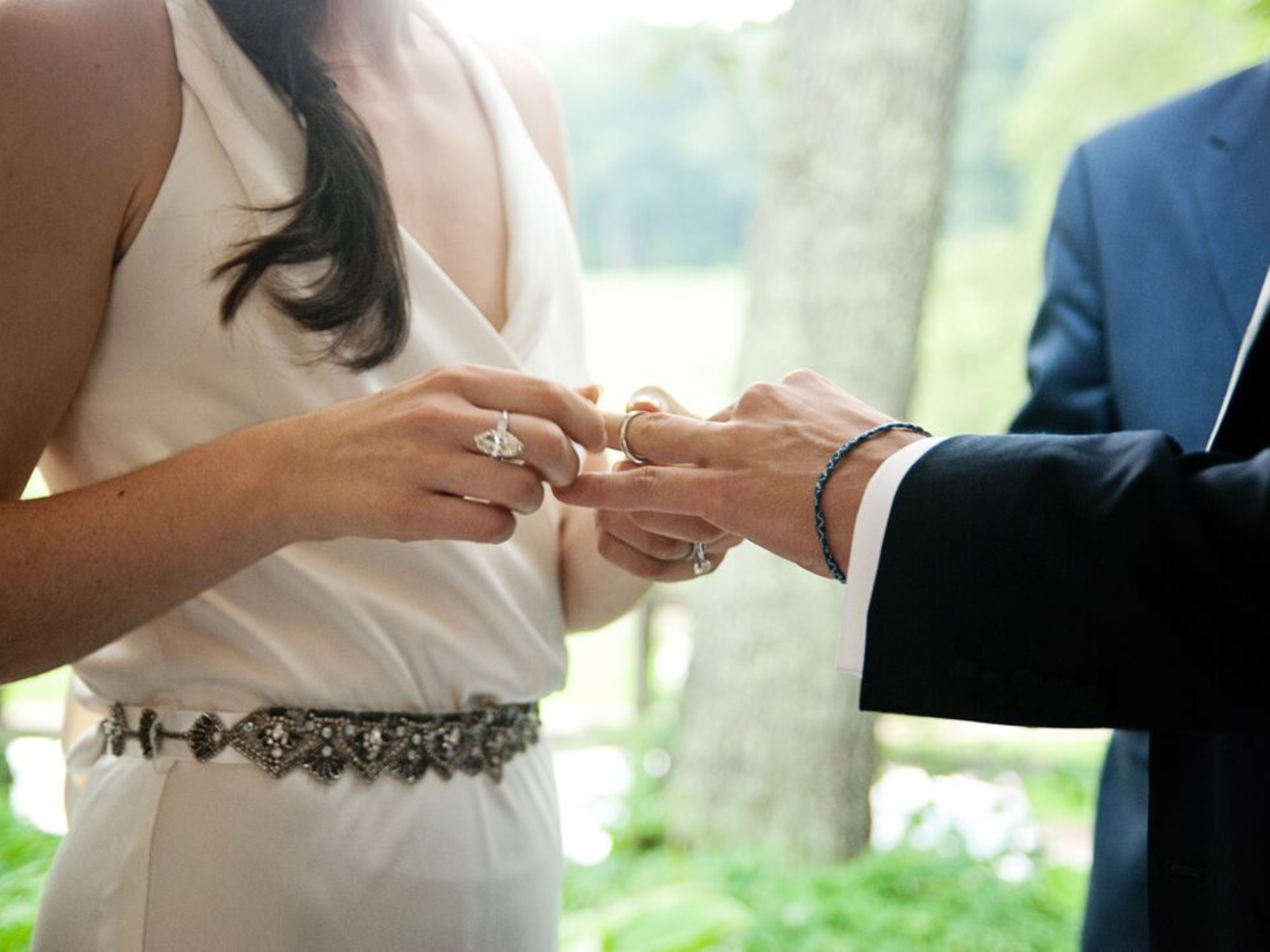
Ask your interfaith officiant questions.
While you're planning your mixed faith wedding ceremony, make sure you ask your officiant (and family) plenty of questions. By having a good understanding of the traditions you're involving, you'll have a better appreciation for them, which will make the ceremony feel more authentic. Make an effort to educate your wedding guests on the rituals they'll be seeing in the ceremony too. Before the wedding, you can include a section on your wedding website that explains the tradition and the symbolism behind it. Then on the wedding day, your interfaith officiant can speak on the traditions as you're performing them so the guests can follow along and feel more included.
Incorporate both faiths in your ceremony decor.
Your and your partner's faiths don't only have to be represented in the readings or vows. Have fun blending your cultures and faiths in your wedding ceremony decor. For example, for a Hindu-Jewish interfaith wedding ceremony, a couple can create a mandap-chuppah structure since both symbolize unity among the family and the couple and the creation of a new home. A Hindu-Jewish couple can also use different colors and traditional fabrics throughout the ceremony venue to celebrate both faiths.
Involve your loved ones.
No matter if you're having a mixed faith, non-religious or Baptist ceremony, including your close friends and family is always a beautiful personal touch that everyone will appreciate. There are numerous ways you can incorporate your loved ones. You can ask them to do a reading from your chosen religious text, sing a hymn or chant that relates to your faith or do a closing prayer at the end of the ceremony. Adding your loved ones to your ceremony will make it even more special and is a sentimental memory you'll never forget.
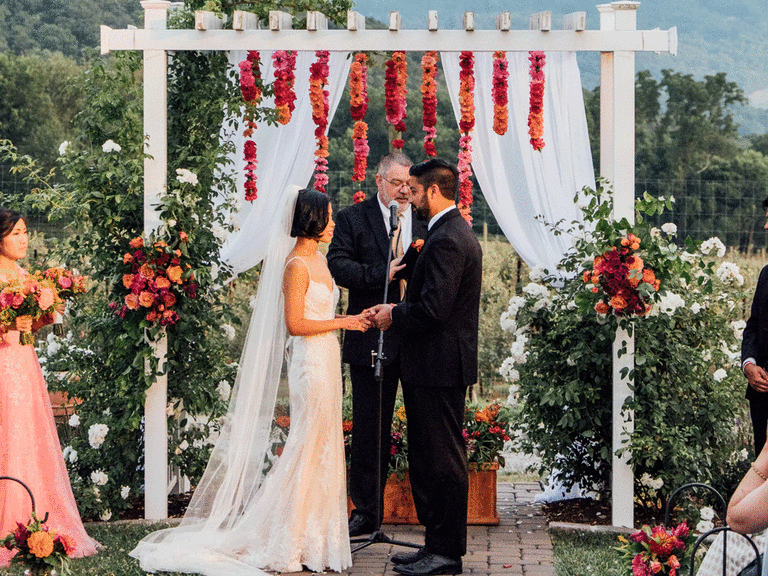
How to Plan a Mixed Faith Wedding Ceremony
Here are answers to the most frequently asked questions from couples planning their mixed faith wedding ceremony. And no, the planning process isn't as hard as you might think.
What is an interfaith wedding ceremony order?
There is no typical interfaith wedding ceremony order. Every interfaith couple will have a completely different ceremony because it depends on the faiths involved and what customs each couple wants to add. Everything from the processional to which sides of the altar the couple and wedding party stand on is determined by the couple's faiths. So speak with your partner, family and interfaith officiant about how you would like your wedding ceremony outline to look.
What can't I leave out of my interfaith ceremony?
There aren't any traditions you're required to include in your ceremony to make your marriage legal. Acts that are necessary are the declaration of intent (this requirement depends on state laws), a marriage license and an officiant to sign the marriage license. If you would like, you can take suggestions from your interfaith officiant or family members for which rituals they feel would make the ceremony more complete. But at the end of the day, it's up to you what rituals you put in your mixed faith wedding ceremony outline.
Where can I have a mixed faith wedding ceremony?
You can get married anywhere if you're having a mixed faith wedding ceremony. We suggest you choose a secular wedding venue so no family members get upset about one religion being showcased more than the other. Another option is having a religious ceremony with close friends and family in a house of worship at the beginning of your wedding day and a non-religious ceremony with all your wedding guests at a different venue later in the day.
How do I find an interfaith officiant?
A wedding ceremony is arguably the most emotional and intimate event of the entire wedding. With that said, you'll want someone presiding over your ceremony who can effortlessly and respectfully incorporate both your and your partner's faiths beautifully. Start your search on The Knot Marketplace, read reviews and look at real wedding photos to help you find the perfect interfaith officiant for you.
Can I have two officiants?
Yes, you can have two officiants. Your officiants can lead two separate ceremonies or cover different traditions in the same ceremony. You'll have to do some research to see which religious leaders, ones who typically don't do interfaith weddings, are comfortable co-officiating with an interfaith officiant. This means telling your potential officiants your expectations immediately is key to your ceremony going smoothly. Open communication is also vital between the two officiants. You don't want any surprises or confusion around who's performing which custom or reading. Meet with your officiants individually and together so you can plan and ensure your officiants work in harmony.
